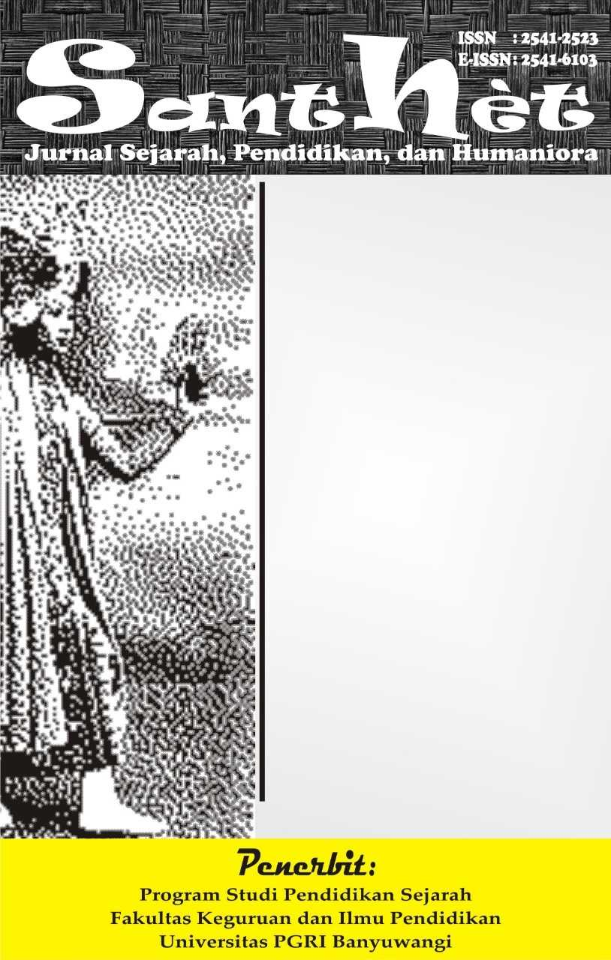The Effect of Transformational Leadership On Innovative Work Behavior Moderated by Psychological Empowerment Variable On Employees Of Hv Tang Aia Tourist Object
Pengaruh Kepemimpinan Transformasional terhadap Innovative Work Behavior melalui Psychological Empowerment pada Karyawan Objek Wisata HV Tang Aia
DOI:
https://doi.org/10.36526/santhet.v9i6.5008Keywords:
Innovative work behavior, transformational leadership, psychological empowerment, employeeAbstract
This research for influence transformational leadership on Innovative Work Behavior with Psychological Empowerment as a moderating. The research uses the Social Exchange Theory to explore these relationshi[. The object of this research is HV Tang Aia tourist attraction. This research have 45 responden. The sampling technique in this study used total sampling. This research used primary data from questionnaires via google form, with measurements 5-point Likert scale. The results showed that transformational leadership has positive and signifikan affects innovative work behavior. Psychological empowerment can moderate the relationship between transformational leadership and innovative work behavior in employees.
References
Bin Saeed, B., Afsar, B., Shahjehan, A., & Imad Shah, S. (2019). Does transformational leadership foster innovative work behavior? The roles of psychological empowerment, intrinsic motivation, and creative process engagement. Economic Research-Ekonomska Istrazivanja , 32(1), 254–
281. https://doi.org/10.1080/1331677X.2018.1556108
Breevaart, K.; Bakker, A.B. (2018). Daily job demands and employee work engagement: The role of daily transformational leadership behavior. J. occup. health psychol. 23, 338–349. https://doi.org/10.1037/ocp0000082
Chiniara, M., & Bentein, K. (2016). Linking servant leadership to individual performance: Differentiating the mediating role of autonomy, competence and relatedness need satisfaction. Leadership Quarterly, 27(1), 124–141. https://doi.org/10.1016/j.leaqua.2015.08.004
Choi, S.B.; Kim, K.; Ullah, S.E.; Kang, S.-W. (2016). How transformational leadership facilitates innovative behavior of Korean workers: Examining mediating and moderating processes. Pers. Rev, 45, 459–479. https://doi.org/10.1108/PR-03-2014-0058
Chowhan, J.; Pries, F.; Mann, S. (2017). Persistent innovation and the role of human resource management practices, work organization, and strategy. J. Manag. Organ., 23, 456–471. https://doi.org/10.1017/jmo.2016.8
De Jong, J. P. J., & Den Hartog, D. N. (2007). How leaders influence employees’ innovative behaviour. European Journal of Innovation Management, 10(1), 41–64. https://doi.org/10.1108/14601060710720546
Grošelj, M., Černe, M., Penger, S., & Grah, B. (2020). Authentic and transformational leadership and innovative work behaviour: the moderating role of psychological empowerment. European Journal of Innovation Management, 24(3), 677–706. https://doi.org/10.1108/EJIM-10-2019-0294 Janssen, O., Van De Vliert, E., & West, M. (2004). The bright and dark sides of individual and group innovation: A Special Issue introduction. In Journal of Organizational Behavior (Vol. 25, Issue 2,
pp. 129–145). https://doi.org/10.1002/job.242
Jha, S. (2014). Transformational leadership and psychological empowerment. South Asian Journal of Global Business Research, 3(1), 18–35. https://doi.org/10.1108/sajgbr-04-2012-0036
Javed, B.; Naqvi, S.M.M.R.; Khan, A.K.; Arjoon, S.; Tayyeb, H.H. (2017). Impact of inclusive leadership on innovative work behavior: The role of psychological safety. J. Manag. Organ. https://doi.org/10.1017/jmo.2017.17
Kim, W.; Park, J. (2017). Examining structural relationships between work engagement, organizational procedural justice, knowledge sharing, and innovative work behavior for sustainable organizations. Sustainability. 9, 205. https://doi.org/10.3390/su9020205
Koesindratmono, F., & Septarini, B. G. (2011). Hubungan antara Masa Kerja dengan Pemberdayaan Psikologis pada Karyawan PT. Perkebunan Nusantara X (Persero). Insan, 13(1).
Li, H., Sajjad, N., Wang, Q., Ali, A. M., Khaqan, Z., & Amina, S. (2019). Influence of transformational leadership on employees’ innovative work behavior in sustainable organizations: Test of mediation and moderation processes. Sustainability (Switzerland), 11(6). https://doi.org/10.3390/su11061594
Mahardika, P. S., & Syarifah, D. (2021). Pengaruh Kepemimpinan Transformasional dan Iklim Organisasi terhadap Perilaku Kerja Inovatif pada Karyawan Industri Perhotelan. Buletin Riset Psikologi Dan Kesehatan Mental (BRPKM), 1(1), 387–395. https://doi.org/10.20473/brpkm.v1i1.24929
Masood, M.; Afsar, B. (2017). Transformational leadership and innovative work behavior among nursing staff. Nurs. Inq. 24, e12188. https://doi.org/10.1111/nin.12188
Para-González, L.; Jiménez-Jiménez, D.; Martínez-Lorente, A.R. (2018). Exploring the mediating effects between transformational leadership and organizational performance. Empl. Relat. 40, 412–432. https://doi.org/10.1108/ER-10-2016-0190
Pieterse, A. N., van Knippenberg, D., Schippers, M., & Stam, D. (2010). Transformational and transactional leadership and innovative behavior: The moderating role of psychological empowerment. Journal of Organizational Behavior, 31(4), 609–623. https://doi.org/10.1002/job.650
Pradhan, S.; Pradhan, R.K. An (2015). empirical investigation of relationship among transformational leadership, affective organizational commitment and contextual performance. 19, 227–235.
Scott, S. G., & Bruce, R. A. (1994). Determinants of Innovative Behavior: A Path Model of Individual Innovation in the Workplace. In Source: The Academy of Management Journal (Vol. 37, Issue 3). Shanker, R., Bhanugopan, R., van der Heijden, B. I. J. M., & Farrell, M. (2017). Organizational climate for innovation and organizational performance: The mediating effect of innovative work behavior.
Journal of Vocational Behavior, 100, 67–77. https://doi.org/10.1016/j.jvb.2017.02.004
Škerlavaj, M., Černe, M., Dysvik, A., Nerstad, C. G. L., & Su, C. (2019). Riding two Horses at Once: The Combined Roles of Mastery and Performance Climates in Implementing Creative Ideas. European Management Review, 16(2), 285–302. https://doi.org/10.1111/emre.12151
Spreitzer, G. M. (1995). Psychological Empowerment in the Workplace: Dimensions, Measurement, and Validation. In Source: The Academy of Management Journal (Vol. 38, Issue 5).
Sugiyono. (2019). Metode Penelitian Kuantitatif, Kualitatif, dan R&D. Alfabeta.
Sukarajap, M. A. (2016). Pengaruh Kepemimpinan Transformasional terhadap Kepuasan Kerja dan Komitmen Organisasional dengan Dimediasi Oleh Pemberdayaan Psikologis. Jurnal Psikologi, 12, 22–45.
Thomas, K. W., & Velthouse, B. A. (1990). Cognitive Elements of Empowerment: An “Interpretive” Model of Intrinsic Task Motivation. In Source: The Academy of Management Review (Vol. 15, Issue 4).
Walumbwa, F. O., Lawler, J. J., Avolio, B. J., Peng Wang, & Kan Shi. (2005). Transformational Leadership and Work-Related Attitudes: The Moderating Effects of Collective and Self-Efficacy Across Cultures. Journal of Leadership & Organizational Studies, 11(3), 2–16. https://doi.org/10.1177/107179190501100301
Wijaya, I. K., Putra, I. N. D., & Suwena, I. K. (2022). The Impact of Innovation Stagnation on Tourist Satisfaction in Bali’s Eco-Resorts. Journal of Tourism and Hospitality Management, 10(2), 56– 70.
Zhang, Q., Rashid Abdullah, A., Hossan, D., & Hou, Z. (2021). The effect of transformational leadership on innovative work behavior with moderating role of internal locus of control and psychological empowerment. Management Science Letters, 11, 1267–1276. https://doi.org/10.5267/j.msl.2020.11.0012
Zhang, X., & Bartol, K. M. (2010). LINKING EMPOWERING LEADERSHIP AND EMPLOYEE CREATIVITY: THE INFLUENCE OF PSYCHOLOGICAL EMPOWERMENT, INTRINSIC
MOTIVATION, AND CREATIVE PROCESS ENGAGEMENT. Academy of Management Journal, 53(1), 107–128.
Zuraik, A., & Kelly, L. (2019). The role of CEO transformational leadership and innovation climate in exploration and exploitation. European Journal of Innovation Management, 22(1), 84–104. https://doi.org/10.1108/EJIM-10-2017-0142





























